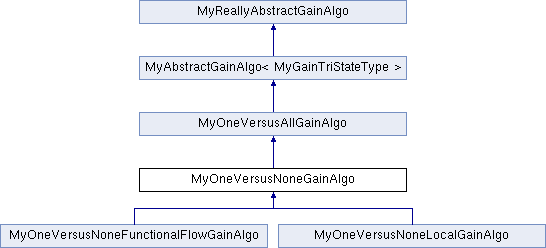|
Biorithm
1.1
|
|
Biorithm
1.1
|

Public Member Functions | |
| MyOneVersusNoneGainAlgo (MyGainGraph &g, MyAnnotations &a, MyGainParams &p, Reporter &r, GeneOntology *go=NULL) | |
| virtual void | initialiseNodeStates (const BioFunction &function, MyNodeIdList &nodesToAnnotate) |
| virtual void | setCrossValidationList (MyNodeIdList &nodesToAnnotate, const MyNodeIdList &cvList) |
| virtual string | getName () |
| virtual string MyOneVersusNoneGainAlgo::getName | ( | ) | [inline, virtual] |
Return the name of the algorithm.
Reimplemented from MyOneVersusAllGainAlgo.
Reimplemented in MyOneVersusNoneLocalGainAlgo, and MyOneVersusNoneFunctionalFlowGainAlgo.
| void MyOneVersusNoneGainAlgo::initialiseNodeStates | ( | const BioFunction & | function, |
| MyNodeIdList & | nodesToAnnotate | ||
| ) | [virtual] |
Initialise the states of the nodes in the graph. Each node annotated with function gets the state ANNOTATED_STATE; these nodes are "clamped," i.e., the algorithm will not change their states. All other nodes get the state HYPOTHETICAL_STATE. The algorithm may change the states of these nodes. In other words, these nodes are not clamped. The argument nodesToAnnotate contains the IDs of the unclamped nodes.
For every node ID in nodes, "remember" its state information and clamp it, so that MyOneVersusNoneGainAlgo::run() can't modify the state of that node.
| [in] | nodes,the | list of node whose initial state must be unmasked. |
Reimplemented from MyOneVersusAllGainAlgo.
| void MyOneVersusNoneGainAlgo::setCrossValidationList | ( | MyNodeIdList & | nodesToAnnotate, |
| const MyNodeIdList & | cvList | ||
| ) | [virtual] |
Given a list of unannotated nodes (nodesToAnnotate) and a list of nodes to cross validate (cvList),update nodesToAnnotate to include nodes in cvList, so that the annotation algorithm also annotates the nodes in cvList.
Reimplemented from MyAbstractGainAlgo< MyGainTriStateType >.
 1.7.6.1
1.7.6.1